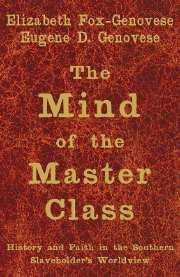Book contents
- Frontmatter
- Contents
- Preface
- List of Abbreviations
- Prologue
- PART ONE CRADLED IN THE STORMS OF REVOLUTION
- PART TWO THE INESCAPABLE PAST
- PART THREE ANCIENT LEGACIES, MEDIEVAL SENSIBILITY, MODERN MEN
- PART FOUR A CHRISTIAN PEOPLE DEFEND THE FAITH
- 13 A Christian People
- 14 Unity and Diversity among the Faithful
- 15 War over the Good Book
- 16 Slavery: Proceeding from the Lord
- 17 The Holy Spirit in the Word of God
- 18 Jerusalem and Athens – Against Paris
- 19 Serpent in the Garden: Liberal Theology in the South
- 20 Theopolitics: Golden Rule, Higher Law, and Slavery
- Coda: St. John of Pottawatamie
- PART FIVE AT THE RUBICON
- Epilogue: King Solomon's Dilemma
- Supplementary References
- Index
18 - Jerusalem and Athens – Against Paris
Published online by Cambridge University Press: 05 June 2012
- Frontmatter
- Contents
- Preface
- List of Abbreviations
- Prologue
- PART ONE CRADLED IN THE STORMS OF REVOLUTION
- PART TWO THE INESCAPABLE PAST
- PART THREE ANCIENT LEGACIES, MEDIEVAL SENSIBILITY, MODERN MEN
- PART FOUR A CHRISTIAN PEOPLE DEFEND THE FAITH
- 13 A Christian People
- 14 Unity and Diversity among the Faithful
- 15 War over the Good Book
- 16 Slavery: Proceeding from the Lord
- 17 The Holy Spirit in the Word of God
- 18 Jerusalem and Athens – Against Paris
- 19 Serpent in the Garden: Liberal Theology in the South
- 20 Theopolitics: Golden Rule, Higher Law, and Slavery
- Coda: St. John of Pottawatamie
- PART FIVE AT THE RUBICON
- Epilogue: King Solomon's Dilemma
- Supplementary References
- Index
Summary
What has Athens to do with Jerusalem? What concord is there between the Academy and the Church? what between heretics and Christians?
—TertullianThere was no disagreement: Young Southerners, in particular the young men slated to steer southern slave society through times of mortal danger, had to be steeped in moral philosophy. Moral philosophy meant core Christian doctrine. Core Christian doctrine had to be defended through reason as well as upheld through faith. Hence, southern college students were treated with heavy doses of “Evidences of Christianity.” “Evidences” offered historical accounts for miracles – a major point in William Paley's textbooks on moral philosophy and ethics. A good many southern schools also assigned the work of President Francis Wayland of Brown University. Hampton-Sidney added Bishop Joseph Butler to Paley when it inaugurated its own course in 1825, and LaGrange College in Tennessee and Oglethorpe College in Georgia added Archibald Alexander. The Associate Presbyterians at Erskine College in western South Carolina used Butler; Baptist and Methodist Colleges used Paley. Municipal and state colleges – the College of Charleston, South Carolina College, and the universities of Alabama, Mississippi, and Louisiana – introduced courses in evidences of Christianity. While Mr. Jefferson spun in his grave, even the University of Virginia, the most secular of the southern universities, offered such a course in 1851/52 with lectures by a string of Presbyterian divines.
But the divines wondered whether courses in moral philosophy and evidences of Christianity, instead of demonstrating the compatibility of the Bible and science, might inadvertently serve as transmission belts for those on their way from Christian theology to materialism or to some non-Christian ethical theory.
- Type
- Chapter
- Information
- The Mind of the Master ClassHistory and Faith in the Southern Slaveholders' Worldview, pp. 566 - 586Publisher: Cambridge University PressPrint publication year: 2005



